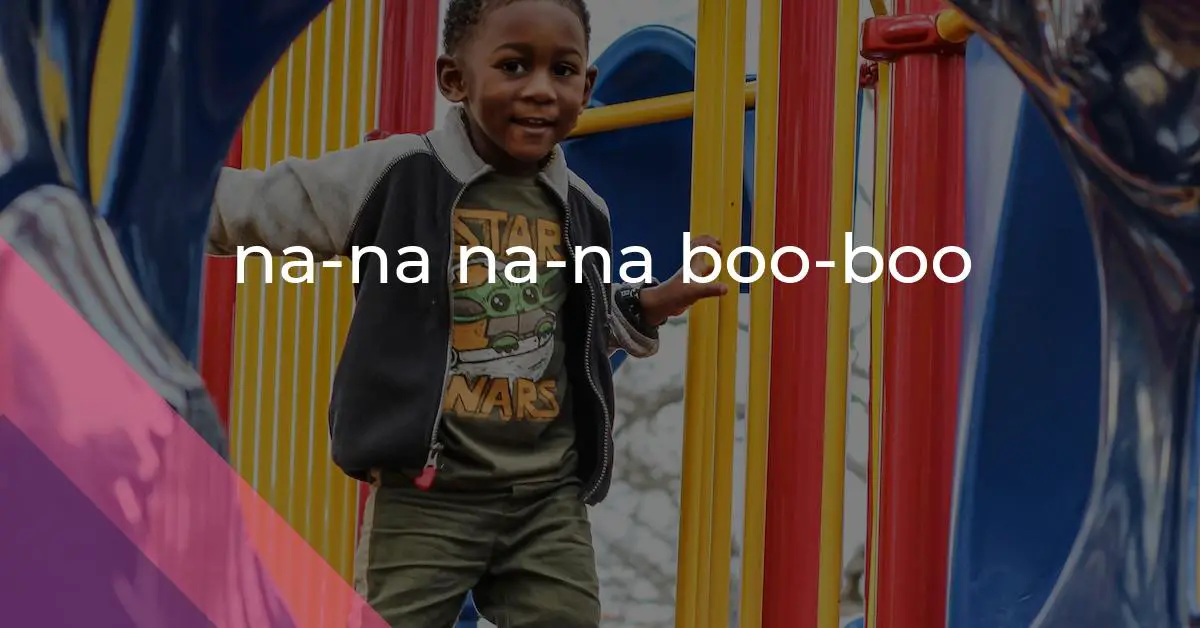na-na na-na boo-boo: Idiom Meaning and Origin
What does ‘na-na na-na boo-boo’ mean?
The idiom "na-na na-na boo-boo" is a childish taunt used to gloat or tease someone in a mocking manner.

Idiom Explorer
The idiom "thumb one's nose" means to mock or show disrespect to someone or something in a defiant or insolent manner.
The idiom "quelle surprise" is a sarcastic remark used to express a lack of surprise or to mock something that is expected or predictable.
The idiom "no biggie" is commonly used informally to express that something is not a problem or not a significant issue.
The idiom "no harm, no foul" means that if no damage or harm has been done, then there is no need to be upset or hold someone responsible for their actions.
The idiom "nip at" means to bite or snap at someone or something in a quick and aggressive manner. It can also be used metaphorically to describe criticizing or attacking someone verbally.
The idiom "never mind" is used to dismiss or disregard something that has been said or done, indicating that it is not important or relevant.
The idiom "my foot" is used to express disbelief or disagreement with something someone has said or suggested.
The idiom "my bad" is used to apologize for one's mistake or take responsibility for a blunder. It acknowledges personal fault or error in a casual and colloquial manner.
An idiom meaning a foolish or pointless activity.
Unveiling Childhood Teasing
The idiom "na-na na-na boo-boo" emerged in the early 20th century as a playful taunting phrase primarily used by children to provoke or mock their peers. While its exact origin remains uncertain, it is believed to have originated in the United States and has since become a popular form of teasing. This idiom is often accompanied by a triumphant tone and aims to belittle the recipient in a lighthearted manner. Its repetitive and rhythmic nature, with the repeated syllables "na-na" followed by "boo-boo," adds to its taunting effect.
One related idiom is "for chrissake." This phrase is typically used to express frustration or exasperation, often in response to a difficult or challenging situation. It can be seen as an exclamation of exasperation, similar to "na-na na-na boo-boo." Both idioms serve as ways to express emotions, with "for chrissake" conveying frustration and "na-na na-na boo-boo" expressing mock superiority.
Another related idiom is "Bronx cheer," which refers to the act of blowing a raspberry or making a derisive sound by vibrating one's lips. This act is often used to express contempt or disapproval, similar to the playful taunting conveyed by "na-na na-na boo-boo." While "na-na na-na boo-boo" is primarily verbal, the "Bronx cheer" is a physical gesture that can accompany or replace the verbal taunt.
The final related idiom is "oof-bird." This phrase is not as well-known as the others but is still relevant in the context of playful taunting. "Oof-bird" is often used to mock or tease someone, similar to the purpose of "na-na na-na boo-boo." While it may not have the same level of familiarity or widespread usage, "oof-bird" shares the theme of light-hearted provocation and playful mockery.
Although "na-na na-na boo-boo" is commonly associated with children, it has also made its way into popular culture, appearing in cartoons, movies, and TV shows. In these media portrayals, characters playfully taunt each other using this idiom. Furthermore, adults have adopted the use of "na-na na-na boo-boo" in certain contexts, such as comedy or nostalgic references to childhood. This adoption reflects the enduring appeal of the idiom and its ability to evoke playful nostalgia for both children and adults.
It is important to note that while "na-na na-na boo-boo" is generally used in a light-hearted manner, its usage can sometimes escalate into more negative or aggressive forms of teasing. In these instances, the idiom may be used with the intent to provoke or harass someone, potentially leading to conflicts or hurt feelings. However, its original intent is not inherently malicious, but rather a form of harmless taunting.
The origins of "na-na na-na boo-boo" are not definitively established, but speculation suggests that the rhythmic nature of the idiom may have been influenced by nursery rhymes or playground chants. The sing-song quality, combined with the simplicity of the phrase, makes it easy to adapt for teasing and provoking. Despite the lack of concrete evidence, "na-na na-na boo-boo" continues to persist in popular culture and has become an iconic idiom associated with good-natured taunting.
The idiom "na-na na-na boo-boo" emerged as a playful taunting phrase used primarily by children. Its origins are uncertain, but it is believed to have originated in the United States. This idiom is often accompanied by a triumphant tone and aims to belittle the recipient in a lighthearted manner. It shares similarities with related idioms such as "for chrissake," "Bronx cheer," and "oof-bird." While "na-na na-na boo-boo" is commonly associated with children, it has also been adopted by adults in certain contexts. It is important to use this idiom in a playful and harmless manner, as its original intent is not inherently malicious. The enduring popularity of "na-na na-na boo-boo" can be attributed to its simplicity, rhythmic nature, and association with playful taunting.
Example usage
Examples of how the idiom "na-na na-na boo-boo" can be used in a sentence:
- "I won the game, and all you can say is 'na-na na-na boo-boo'." - In this example, the idiom is used to taunt or tease someone who is on the losing side.
- "Don't be a sore loser and resort to 'na-na na-na boo-boo'." - In this sentence, the idiom is used to refer to the childish act of gloating in a condescending way.
- "Just because you were promoted doesn't mean you should 'na-na na-na boo-boo' your colleagues." - Here, the idiom is used to suggest that one should not boast or rub their success in others' faces.
More "Childish" idioms
We missed the mark - nothing found.



